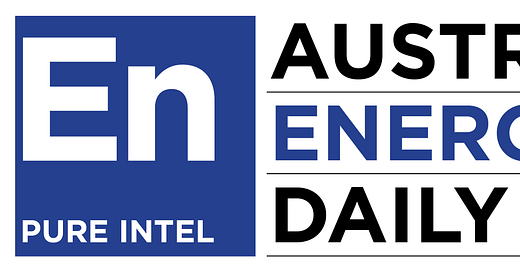Day 12: What misconduct?
An introductory weekday newsletter from Schwartz Media. Counting the days since Australia had an energy policy.

Good morning and welcome to day 12.
Today in summary: Australian Energy Council chief Sarah McNamara reminded Energy Minister Angus Taylor the ACCC pricing inquiry found no evidence of misconduct in the energy market; Queensland is investing A$250 million in state-owned renewable energy generator CleanCo; Western Australia pitched for more oil & gas love; and a major global study from Yale University looked at greenhouse gas mitigation efforts of individual cities, regional governments and companies around the world. It found they could lead to carbon emissions of between 0.2 and 0.7 billion tonnes lower than national policies alone by 2030.
— Charis
Today’s policy spin level: 💨💨💨
Angus Taylor, AKA The Minister for Reducing Electricity Prices, hasn’t found a friend in Australian Energy Council chief Sarah McNamara. McNamara told The Guardian the shelving of the NEG would exacerbate the very problems the new energy minister has said he wants to solve. On Thursday, Taylor suggested the government could intervene to break up power companies found price gouging, but McNamara reminded him the ACCC has labelled this an “extreme measure”, with more effective interventions still available. She said while power companies needed to be more transparent on pricing, the ACCC had not found evidence of misconduct by the sector.
The Guardian | The Australian Financial ReviewQueensland Premier Annastacia Palaszczuk said CleanCo, a new government owned renewable energy generator, would shave around A$70 a year off household power bills. CleanCo will start with 1000MW of renewables like solar, wind and hydro and is expected to be trading in the NEM by mid-2019. Queensland LNP Deputy Leader Tim Mander said the announcement was “nothing more than a PR stunt” that wouldn’t lower electricity prices. He pointed to the ACCC’s pricing inquiry comment that:
“A renewable-only portfolio is unlikely to offer the same level of competitive constraint in the market due to the way renewable generation is typically bid into the market”.
Meanwhile, the Queensland Resources Council welcomed the announcement.
Western Australia’s Agent General Mike Deeks is in Norway, drumming up interest in what he said was a A$130 billion market for oil and gas maintenance and operations in the state. The transition from the decade-long LNG construction phase to steady-state production is expected to trigger an internationally significant maintenance program.
The West AustralianAll those cities, regional governments and companies going it alone on carbon reduction projects are likely to knock between 0.2 and 0.7 billion tonnes off carbon emissions by 2030, according to a new report from Yale University. The study comes after US tech giant Facebook said it would cut its greenhouse gas emissions by 75% in 2020, by powering its worldwide operations solely with renewable energy. The report evaluated individual climate mitigation commitments made by nearly 6,000 cities, states, and regions and more than 2,000 companies across 9 high-emitting countries including the US and European Union. It found even steeper reductions were possible if all of these groups buddied up.
Yale University
Data
Business investment activity is starting to mirror the slump the energy sector has been warning of as businesses seemingly sit on their chequebooks in anticipation of policy certainty. Private capex fell 2.5% in the June quarter, well below market expectations of 0.6% growth. Investment is weak in mining, construction and plant and equipment. Expectations for investment in the 2018-19 FY have however been revised upwards.
Geopolitics
China’s move to slash subsidies for domestic solar installations has dulled the impact of US President Donald Trump’s tariffs on solar imports. Cheap Chinese-made panels are now flooding the global market, pushing prices down.
Reuters
Canadian Prime Minister Justin Trudeau’s plan to boost oil exports to Asia was dealt a blow when a Canadian court of appeal found his government had failed to fulfil its legal duty to consult indigenous people over the proposed Trans Mountain pipeline. Bloomberg
Coming up
The bosses of Santos, Origin Energy and Shell are likely to be summoned to federal Resources Minister Matt Canavan’s office within two weeks ahead of a critical decision on potential curbs on LNG exports next year. Canavan is consulting with industry before deciding whether to control exports next year.
The Australian Financial Review
The Commentariat
Energy Minister Angus Taylor is “rightly sceptical of all the high-falutin schemes that governments dream up and which companies then game at the expense of consumers,” writes The Australian’s Judith Sloan. She says one way Taylor could push down electricity prices is to insist retailers offer a low-price default option, with the price set by the regulator, in place of current standing offers. That, and extending the life of legacy coal-fired plants.
The government, in its desperation to be seen to be doing something on prices, will continue to cast the electricity sector as “gougers” and “bandits,” writes the Australian Financial Review’s Matthew Stevens. He warns default pricing risks more of the unintended policy consequences that got us all here in the first place.
This is an introductory service while we’re building a comprehensive daily paid online publication, coming in early 2019.
We’re not here to take sides, simply to cut through the noise, and help you make sense of the emerging policy and market trends you need to be across. We call it pure intel. You can read more about us here.


